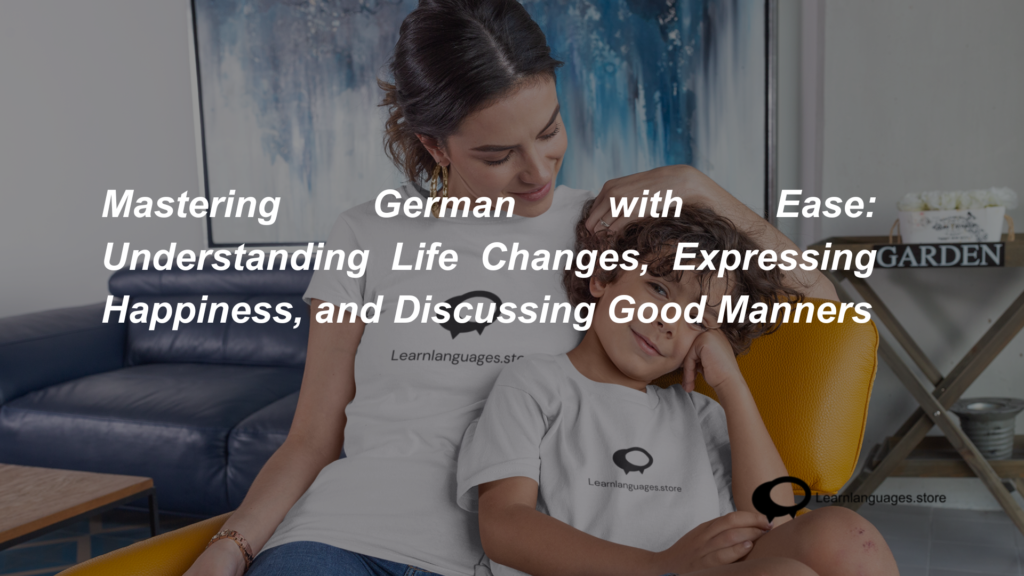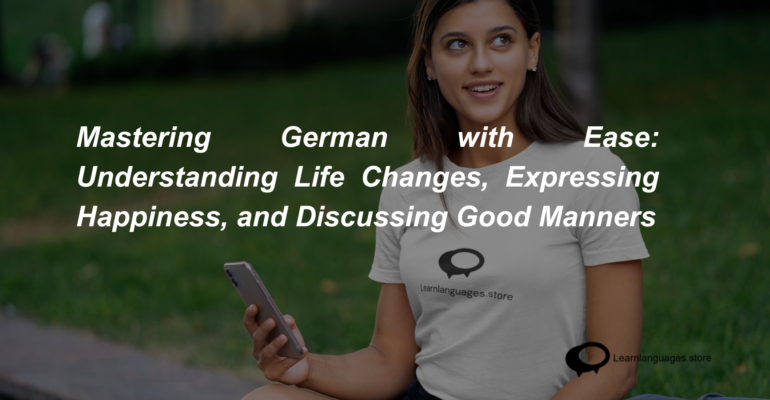Mastering German with Ease: Understanding Life Changes, Expressing Happiness, and Discussing Good Manners
Mastering German with Ease: Understanding Life Changes, Expressing Happiness, and Discussing Good Manners
Estimated reading time: 14 minutes
Introduction
Learning German at the B1 level is an exciting journey that opens up new ways to communicate and connect with the world around you. This blog is designed to guide you through key themes such as understanding life changes, talking about the past, expressing happiness, making time references, and discussing good manners. With detailed vocabulary tables, grammar notes, and cultural insights, you’ll find that mastering these topics is not only achievable but also enjoyable.

1. Berichte über Veränderungen im Leben verstehen (Understanding Reports About Life Changes)
Life is full of changes, and being able to understand and discuss these changes in German is crucial. Whether it’s moving to a new city, starting a new job, or any other significant event, the vocabulary and expressions used can help you navigate these conversations confidently.
Vocabulary Table: Ereignisse im Leben (Life Events)
| German Word | English Translation | Example Sentence | Hindi Pronunciation |
|---|---|---|---|
| die Veränderung | Change | Die Veränderung war schwierig für ihn. (The change was difficult for him.) | दी फेरएन्डरुंग |
| der Umzug | Move | Der Umzug nach Berlin war aufregend. (The move to Berlin was exciting.) | देर उम्त्सुग |
| die Hochzeit | Wedding | Ihre Hochzeit war wunderschön. (Their wedding was beautiful.) | दी होख़्त्साइट |
| der Jobwechsel | Job change | Ein Jobwechsel kann stressig sein. (A job change can be stressful.) | देर जोबवेख़्सल |
| die Geburt | Birth | Die Geburt ihres Kindes war ein Wunder. (The birth of their child was a miracle.) | दी गेबुर्ट |
Grammar Note: Präteritum
The Präteritum (simple past tense) is often used in written narratives and formal contexts. It is important for describing events that have already happened, especially in stories, reports, and formal writing.
- Example:
Er ging nach Hause.
(He went home.)
Hindi Pronunciation: एर गिंग नाख हाउज़े.
Structure Explanation:
- In the Präteritum, regular verbs typically add -te to the stem, while irregular verbs undergo a stem vowel change. For example:
- Regular: lernen (to learn) → lernte (learned)
- Irregular: gehen (to go) → ging (went)
More Examples:
- Er arbeitete den ganzen Tag. (He worked all day.)
Hindi Pronunciation: एर अर्बाइटेटे डेन गान्ट्सन ताख़. - Sie sprach über ihre Reise. (She spoke about her trip.)
Hindi Pronunciation: ज़ी श्प्राख उबर इरे राइज.
Cultural Note: Boxen – mehr als nur ein Sport
Boxing in Germany, Austria, and Switzerland (D-A-CH) is more than just a sport; it’s a way of life that teaches discipline, respect, and resilience. Famous boxers like Max Schmeling are not just athletes but cultural icons. In these countries, boxing is seen as a tool for personal development, and it is widely respected for the values it instills.
2. Über Vergangenes berichten (Talking About the Past)
Discussing past events in German requires a good understanding of both the Präteritum and the Perfekt tenses. These tenses help you recount stories, share experiences, and provide detailed descriptions of what has happened.
Vocabulary Table: Vergangenes (The Past)
| German Word | English Translation | Example Sentence | Hindi Pronunciation |
|---|---|---|---|
| gestern | Yesterday | Gestern war ein schöner Tag. (Yesterday was a beautiful day.) | गेस्टर्न |
| vorgestern | The day before yesterday | Vorgestern habe ich meine Freunde getroffen. (The day before yesterday, I met my friends.) | फोरगेस्टर्न |
| letztes Jahr | Last year | Letztes Jahr bin ich nach Deutschland gereist. (Last year, I traveled to Germany.) | लेट्स्टेस यार |
| vor zwei Wochen | Two weeks ago | Vor zwei Wochen habe ich ein neues Buch gelesen. (Two weeks ago, I read a new book.) | फोर त्स्वाई वोक्हेन |
| früher | Earlier/in the past | Früher war alles anders. (In the past, everything was different.) | फ्र्यूअर |
Grammar Note: Zeitangaben mit Dativ und Genitiv
Time expressions in German often use the Dative or Genitive case, depending on the preposition. Common prepositions include seit (since), ab (from), bis (until), and während (during).
- Example with Dative:
Seit einem Jahr lerne ich Deutsch.
(I have been learning German for a year.)
Hindi Pronunciation: साइट आइनेम यार लर्ने इश डॉयच. - Example with Genitive:
Während des Urlaubs habe ich viel gelesen.
(During the vacation, I read a lot.)
Hindi Pronunciation: वेरेंड देस ऊरलाख़्ब्स हाबे इश फिल गेजेहेन.
Structure Explanation:
- Dative Case: Used after seit and ab to indicate time duration.
- Genitive Case: Used after während to specify a period during which something happens.
More Examples:
- Ab nächster Woche beginnt der Kurs.
- (The course starts next week.)
Hindi Pronunciation: आब नेख़्स्टर वोक्हे बेगिन्ट देर कुर्स. - Bis morgen muss ich die Arbeit erledigen. (I have to finish the work by tomorrow.)
Hindi Pronunciation: बिस मॉर्गेन मुथ इश दी आर्बाइट एर्लेडीगेन.
-
Product on sale
 German B1
German B1₹32,600.00
₹42,600.00 -
Product on sale
 German A2
German A2₹24,300.00
₹32,600.00
Cultural Note: Höflichkeit in D-A-CH
Höflichkeit (politeness) is an important part of everyday interactions in German-speaking countries. People in Germany, Austria, and Switzerland value respectful communication, which often includes using formal forms of address (like “Sie” instead of “du”) in professional and public settings. This reflects the culture’s emphasis on mutual respect and consideration.
3. Über Glück sprechen (Talking About Happiness)
Expressing happiness and discussing what brings joy to life is a common theme in conversations. In German, there are specific words and phrases used to talk about happiness, luck, and contentment.
Vocabulary Table: Glück (Happiness/Luck)
| German Word | English Translation | Example Sentence | Hindi Pronunciation |
|---|---|---|---|
| das Glück | Happiness/Luck | Glück ist, Zeit mit der Familie zu verbringen. (Happiness is spending time with family.) | दास ग्ल्युक्क |
| zufrieden | Content | Ich bin mit meinem Leben zufrieden. (I am content with my life.) | इश बिन मिट माइनम लेबेन त्सुफ्रीडेन |
| die Freude | Joy | Die Geburt meines Kindes brachte mir große Freude. (The birth of my child brought me great joy.) | दी फ्रॉयडे |
| das Lächeln | Smile | Ihr Lächeln machte mich glücklich. (Her smile made me happy.) | दास लेख़ेल्न |
| das Glücksgefühl | Feeling of happiness | Ein warmes Glücksgefühl überkam mich. (A warm feeling of happiness overcame me.) | दास ग्ल्युक्क्स्गेफूल |
Grammar Note: Präteritum vs. Perfekt
While the Präteritum is often used in written German, the Perfekt is more common in spoken German for talking about the past. Both tenses describe actions that have been completed, but their usage depends on the context.
- Präteritum Example:
Er ging ins Kino.
(He went to the cinema.)
Hindi Pronunciation: एर गिंग इन्स कीनो. - Perfekt Example:
Er ist ins Kino gegangen.
(He has gone to the cinema.)
Hindi Pronunciation: एर इस्त इन्स कीनो गेगांगन.
Structure Explanation:
- Perfekt is formed with the auxiliary verb haben or sein (conjugated) + the past participle of the main verb.
- Use haben with transitive verbs and sein with verbs of motion or change of state.
More Examples:
- Ich habe das Buch gelesen. (I have read the book.)
Hindi Pronunciation: इश हाबे दास बुख़ गेजेहेन. - Wir sind früh aufgestanden. (We got up early.)
Hindi Pronunciation: वीर ज़िन्ट फ्रू आउफ्गेश्तान्डेन.
4. Zeitangaben machen (Making Time References)
Being able to accurately refer to time is crucial in any language. In German, there are various ways to specify time, from exact dates to relative time references.
Vocabulary Table: Zeitangaben (Time References)
| German Word | English Translation | Example Sentence | Hindi Pronunciation |
|---|---|---|---|
| heute | Today | Heute habe ich viel zu tun. (Today, I have a lot to do.) | होइटे |
| morgen | Tomorrow | Morgen fahre ich nach Berlin. (Tomorrow, I’m going to Berlin.) | मॉर्गेन |
| nächste Woche | Next week | Nächste Woche habe ich Urlaub. (Next week, I have a vacation.) | नेख़्स्टे वोक्हे |
| vor einem Monat | A month ago | Vor einem Monat habe ich einen neuen Job angefangen. (A month ago, I started a new job.) | फोर आइनेम मोनात |
| in zwei Tagen | In two days | In zwei Tagen fahren wir in den Urlaub. (In two days, we are going on vacation.) | इन त्स्वाई तागेन |
Grammar Note: Präpositionen mit Dativ für Zeitangaben
When making time references in German, certain prepositions are used with the dative case. These include ab (from), seit (since), vor (ago), and in (in).
- Example with Dative:
Seit einem Monat lerne ich Deutsch.
(I have been learning German for a month.)
Hindi Pronunciation: साइट आइनेम मोनात लर्ने इश डॉयच. - Example with Dative:
Ab nächster Woche fange ich mit dem neuen Projekt an.
(Starting next week, I will begin the new project.)
Hindi Pronunciation: आब नेख़्स्टर वोक्हे फाँगे इश मिट डेम नोयन प्रॉएक्त आन.
Structure Explanation:
- The noun or time phrase following these prepositions takes the dative case, which often requires changes to the article or noun ending.
More Examples:
- In einer Stunde beginnt der Film. (The movie starts in an hour.)
Hindi Pronunciation: इन आइनेर श्टुंडे बेगिन्ट देर फिल्म. - Vor zwei Tagen war das Wetter besser. (Two days ago, the weather was better.)
Hindi Pronunciation: फोर त्स्वाई तागेन वार दास वेट्टर बेस्सर.
5. Eine Radiosendung verstehen (Understanding a Radio Program)
Listening comprehension is a key skill in language learning, and understanding radio programs in German is an excellent way to improve this skill. Radios often discuss current events, cultural topics, and everyday life, which can help you expand your vocabulary and understanding of spoken German.
Vocabulary Table: Medien und Unterhaltung (Media and Entertainment)
| German Word | English Translation | Example Sentence | Hindi Pronunciation |
|---|---|---|---|
| die Radiosendung | Radio program | Die Radiosendung war sehr informativ. (The radio program was very informative.) | दी रादिओज़ेंदुंग |
| der Moderator | Host/Presenter | Der Moderator stellte interessante Fragen. (The host asked interesting questions.) | देर मोडेरातोर |
| die Nachrichten | News | Ich höre jeden Morgen die Nachrichten. (I listen to the news every morning.) | दी नाखरिख्तेन |
| das Interview | Interview | Das Interview mit dem Autor war spannend. (The interview with the author was exciting.) | दास इंटरव्यू |
| die Musiksendung | Music show | Die Musiksendung spielt tolle Lieder. (The music show plays great songs.) | दी म्यूसिकज़ेंदुंग |
Grammar Note: Using Relative Clauses
Relative clauses in German provide additional information about a noun and are introduced by relative pronouns such as der, die, das (which correspond to “who,” “that,” or “which” in English).
- Example:
Das ist die Radiosendung, die ich jeden Tag höre.
(That is the radio show that I listen to every day.)
Hindi Pronunciation: दास इश्ट दी रादिओज़ेंदुंग, दी इश येडन ताख़ होरे.
Structure Explanation:
- Relative Clause Structure: Main Clause + Relative Pronoun + Verb + Rest of Sentence.
- The relative pronoun agrees with the noun it refers to in gender and number.
More Examples:
- Das ist das Buch, das ich dir empfohlen habe. (That is the book that I recommended to you.)
Hindi Pronunciation: दास इश्ट दास बुख़, दास इश डीर एम्फोह्लेन हाबे. - Der Mann, der dort steht, ist mein Lehrer. (The man who is standing there is my teacher.)
Hindi Pronunciation: देर मान, देर डॉर्ट श्टेहत, इश्ट माइन लेहरर.
6. Von Veränderungen erzählen (Talking About Changes)
Discussing changes, whether personal or societal, is a common part of conversations in German. This can include changes in lifestyle, environment, or even mindset.
Vocabulary Table: Veränderungen (Changes)
| German Word | English Translation | Example Sentence | Hindi Pronunciation |
|---|---|---|---|
| die Veränderung | Change | Veränderungen sind oft schwierig. (Changes are often difficult.) | दी फेरएन्डरुंग |
| der Wandel | Transformation | Der Wandel in der Stadt ist deutlich zu sehen. (The transformation in the city is clearly visible.) | देर वान्डेल |
| die Anpassung | Adaptation | Anpassung an neue Situationen ist wichtig. (Adaptation to new situations is important.) | दी आन्पस्सुंग |
| die Verbesserung | Improvement | Die Verbesserung der Arbeitsbedingungen ist notwendig. (Improvement of working conditions is necessary.) | दी फेरबेस्सेरुंग |
| der Fortschritt | Progress | Der technologische Fortschritt ist beeindruckend. (The technological progress is impressive.) | देर फोर्ट्श्रिट्ट |
Grammar Note: Subordinate Clauses with “weil” and “obwohl”
Subordinate clauses introduced by “weil” (because) and “obwohl” (although) are commonly used to explain reasons or contrast ideas.
- Example with “weil”:
Ich lerne Deutsch, weil ich in Deutschland arbeiten möchte.
(I am learning German because I want to work in Germany.)
Hindi Pronunciation: इश लर्ने डॉयच, वाईल इश इन डॉएट्शलैंड आर्बाइटेन म्योष्ते. - Example with “obwohl”:
Er ging joggen, obwohl es regnete.
(He went jogging although it was raining.)
Hindi Pronunciation: एर गिंग योग्गेन, ओबवोल एस रेग्नेत.
Structure Explanation:
- The verb in the subordinate clause moves to the end when using “weil” and “obwohl”. The main clause usually has normal word order.
More Examples:
- Sie bleibt zu Hause, weil sie krank ist. (She is staying home because she is sick.)
Hindi Pronunciation: ज़ी ब्लाइब्त त्सू हाउज़े, वाईल ज़ी क्रांक इश्ट. - Ich gehe spazieren, obwohl es kalt ist. (I go for a walk, although it is cold.)
Hindi Pronunciation: इश गेहे श्पात्सीरेन, ओबवोल एस काल्ट इश्ट.
7. Einen Gegenstand oder ein Ereignis beschreiben (Describing an Object or an Event)
Describing objects or events is a useful skill in both casual and formal conversations. It allows you to provide detailed information, share experiences, and express opinions.
Vocabulary Table: Beschreibung (Description)
| German Word | English Translation | Example Sentence | Hindi Pronunciation |
|---|---|---|---|
| der Gegenstand | Object | Der Gegenstand auf dem Tisch ist wertvoll. (The object on the table is valuable.) | देर गेगेनश्टान्ड |
| das Ereignis | Event | Das Ereignis war beeindruckend. (The event was impressive.) | दास एराइग्निस |
| die Farbe | Color | Die Farbe des Autos ist rot. (The color of the car is red.) | दी फार्बे |
| die Größe | Size | Die Größe des Pakets ist überraschend. (The size of the package is surprising.) | दी ग्रॉसे |
| die Form | Shape | Die Form des Gebäudes ist ungewöhnlich. (The shape of the building is unusual.) | दी फॉर्म |
Grammar Note: Adjective Endings
When describing objects or events, it’s important to use the correct adjective endings based on the gender, case, and number of the noun.
- Example:
Ein schöner Tag
(A beautiful day)
Hindi Pronunciation: आइन् श्योनर ताख़.
Structure Explanation:
- Adjectives take different endings depending on whether they follow a definite article, indefinite article, or no article at all. For instance:
- Definite article: der schöne Tag (the beautiful day)
- Indefinite article: ein schöner Tag (a beautiful day)
- No article: schöner Tag (beautiful day)
More Examples:
- Ein altes Buch (An old book)
Hindi Pronunciation: आइन् आल्टेस बुख़. - Die grüne Wiese (The green meadow)
Hindi Pronunciation: दी ग्र्यून वीज़े.
8. Über gutes Benehmen sprechen (Discussing Good Manners)
Good manners are an essential part of social interactions, and discussing them in German helps you understand and engage with German-speaking cultures more effectively.
Vocabulary Table: Höflichkeit und Benehmen (Politeness and Manners)
| German Word | English Translation | Example Sentence | Hindi Pronunciation |
|---|---|---|---|
| die Höflichkeit | Politeness | Höflichkeit ist in Deutschland sehr wichtig. (Politeness is very important in Germany.) | दी होफ़्लिक्काइट |
| das Benehmen | Behavior | Gutes Benehmen wird hoch geschätzt. (Good behavior is highly valued.) | दास बिनेमेन |
| die Rücksicht | Consideration | Er nahm Rücksicht auf seine Kollegen. (He was considerate of his colleagues.) | दी रुक्सिक्क्त |
| die Etikette | Etiquette | Sie kennt die Etikette sehr gut. (She knows the etiquette very well.) | दी एटिकेट्टे |
| das Verständnis | Understanding | Verständnis füreinander ist die Grundlage guter Beziehungen. (Understanding for each other is the foundation of good relationships.) | दास फेर्श्तैंड्निस |
Grammar Note: Modal Verbs in Polite Requests
Modal verbs like “können” (can), “dürfen” (may), and “möchten” (would like) are often used in polite requests.
- Example:
Könnten Sie mir bitte helfen?
(Could you please help me?)
Hindi Pronunciation: क्योन्टेन ज़ी मीर बिट्टे हेल्फेन?
Structure Explanation:
- Polite Request Structure: Modal Verb + Subject + Main Verb (infinitive).
- Modal verbs are conjugated to match the subject, while the main verb remains in the infinitive form at the end of the sentence.
More Examples:
- Dürfte ich Ihr Telefon benutzen? (May I use your phone?)
Hindi Pronunciation: ड्यूर्फ्टे इश इर टेलेफोन बिनुत्सेन? - Möchten Sie noch etwas trinken? (Would you like something else to drink?)
Hindi Pronunciation: म्योश्तेन ज़ी नोख़ एतव्स त्रिन्केन?
Cultural Note: Höflichkeit in D-A-CH
In the D-A-CH region (Germany, Austria, Switzerland), politeness is deeply ingrained in the culture. People often use formal titles and last names in professional settings until invited to use first names. This reflects the respect for personal space and the importance of clear boundaries in these cultures.
Enhance Your German Skills!
To improve your German further, consider enrolling in our A1 Level German Course at Learn Languages Store for just Rs. 16,300. Our courses are designed to help you build a strong foundation in the German language in a fun and engaging way.
Contact Us to Learn More!
For more information about our courses, feel free to reach out to us at:
Address:
330, 3rd Floor, Big Splash (Near Vashi Bus Depot),
Sector 17, Vashi,
Navi Mumbai, Maharashtra 400703
Phone: +91-9594113111
Email: services@learnlanguages.store
Don’t miss the opportunity to enhance your language skills! Sign up today and start your journey to fluency in German!
Conclusion
Mastering these German B1 level topics will significantly enhance your ability to communicate effectively in various situations, whether you’re talking about life changes, expressing happiness, or discussing good manners. By understanding the grammar, vocabulary, and cultural nuances, you’ll find yourself speaking German with greater confidence and fluency.










